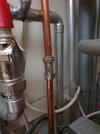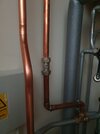- Joined
- 1 Nov 2023
- Messages
- 3
- Reaction score
- 0
- Country

Hi,
Are these valves (in the center of the photos) OK to use for central heating? I have conflicting advice from the plumber who installed them, and another plumber who fixed a leak in my bathroom but saw them and said they shouldn't be used for central heating. Aparently they have a restricted flow and could potentially leak due to the heat going through them. He suggested that full bore, butterfly or gate valves should be used instead.
The pipes go up to my loft. The heater where the pipes go to hasn't been installed yet.
Thanks!
Are these valves (in the center of the photos) OK to use for central heating? I have conflicting advice from the plumber who installed them, and another plumber who fixed a leak in my bathroom but saw them and said they shouldn't be used for central heating. Aparently they have a restricted flow and could potentially leak due to the heat going through them. He suggested that full bore, butterfly or gate valves should be used instead.
The pipes go up to my loft. The heater where the pipes go to hasn't been installed yet.
Thanks!



